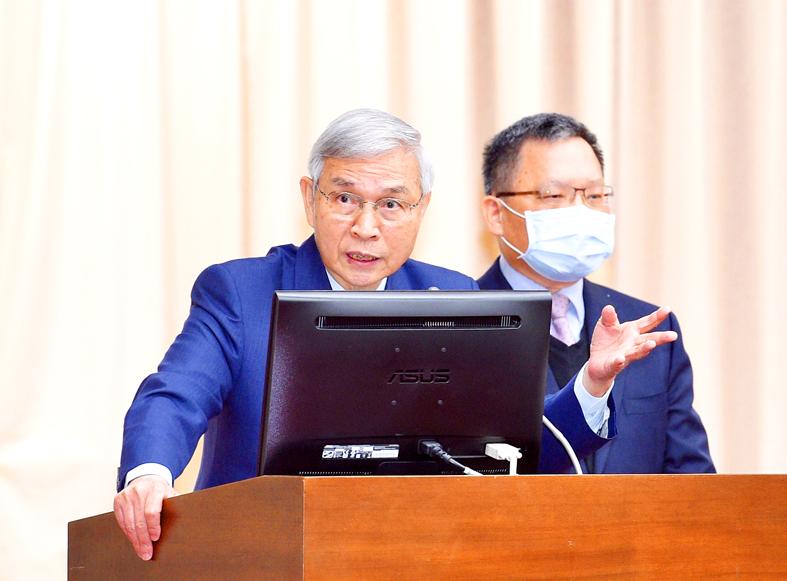The central bank would intervene in the market whenever necessary to help stabilize the New Taiwan dollar, central bank Governor Yang Chin-long (楊金龍) said yesterday, adding that it is concerned Taiwan might be placed on the US watchlist for currency manipulation.
The Control Yuan recently sent letter inquiring about the central bank’s market regulation efforts, Yang told a meeting of the legislature’s Finance Committee on the NT dollar’s appreciation and property price hikes.
“It is the central bank’s top responsibility to stabilize foreign exchanges,” he said.

Photo: Peter Lo, Taipei Times
The central bank has often stepped in toward the end of trading sessions to moderate the NT dollar’s appreciation against the US dollar.
The NT dollar had as of yesterday picked up 3.32 percent against the greenback this year and has on several occasions temporarily surpassed the NT$28.5 defense threshold allegedly set by Yang’s predecessor, Perng Fai-nan (彭淮南).
The central bank has to take action when noticing currency speculation and disorderly fund movements, Yang said.
The governor declined to comment on reports that the NT dollar might next year rise to NT$27.5, but said that global investment banks have mixed views about the US dollar’s outlook.
Taiwan is likely to be added to the US watch list after meeting two criteria: having a trade surplus with the US of at least US$20 billion and a current account surplus of more than 2 percent of GDP, Yang said.
The US normally updates its currency list twice a year, in April and October, but has not released a list so far this year, Yang said, adding that the central bank would try to communicate with the US on the matter.
Yang warned against loose real-estate lending, saying that the government would continue its coordinated efforts to thwart property speculation without affecting real-estate demand.
The endeavor is in the initial stage, but further measures might be implemented if the intended effect is not achieved, Yang said.
In certain sectors of the commercial real-estate market, the price development has been reasonable, as companies are returning production capacity home from China, he said.
Property prices in sectors without such support should be steadier, Yang said, adding that investment accounts for about 14 percent of real-estate financing.
In a best case scenario, the government would achieve its goal of curbing property speculation without putting pressure on local banks, Yang said.

Sweeping policy changes under US Secretary of Health and Human Services Robert F. Kennedy Jr are having a chilling effect on vaccine makers as anti-vaccine rhetoric has turned into concrete changes in inoculation schedules and recommendations, investors and executives said. The administration of US President Donald Trump has in the past year upended vaccine recommendations, with the country last month ending its longstanding guidance that all children receive inoculations against flu, hepatitis A and other diseases. The unprecedented changes have led to diminished vaccine usage, hurt the investment case for some biotechs, and created a drag that would likely dent revenues and

Global semiconductor stocks advanced yesterday, as comments by Nvidia Corp chief executive officer Jensen Huang (黃仁勳) at Davos, Switzerland, helped reinforce investor enthusiasm for artificial intelligence (AI). Samsung Electronics Co gained as much as 5 percent to an all-time high, helping drive South Korea’s benchmark KOSPI above 5,000 for the first time. That came after the Philadelphia Semiconductor Index rose more than 3 percent to a fresh record on Wednesday, with a boost from Nvidia. The gains came amid broad risk-on trade after US President Donald Trump withdrew his threat of tariffs on some European nations over backing for Greenland. Huang further

CULPRITS: Factors that affected the slip included falling global crude oil prices, wait-and-see consumer attitudes due to US tariffs and a different Lunar New Year holiday schedule Taiwan’s retail sales ended a nine-year growth streak last year, slipping 0.2 percent from a year earlier as uncertainty over US tariff policies affected demand for durable goods, data released on Friday by the Ministry of Economic Affairs showed. Last year’s retail sales totaled NT$4.84 trillion (US$153.27 billion), down about NT$9.5 billion, or 0.2 percent, from 2024. Despite the decline, the figure was still the second-highest annual sales total on record. Ministry statistics department deputy head Chen Yu-fang (陳玉芳) said sales of cars, motorcycles and related products, which accounted for 17.4 percent of total retail rales last year, fell NT$68.1 billion, or

Macronix International Co (旺宏), the world’s biggest NOR flash memory supplier, yesterday said it would spend NT$22 billion (US$699.1 million) on capacity expansion this year to increase its production of mid-to-low-density memory chips as the world’s major memorychip suppliers are phasing out the market. The company said its planned capital expenditures are about 11 times higher than the NT$1.8 billion it spent on new facilities and equipment last year. A majority of this year’s outlay would be allocated to step up capacity of multi-level cell (MLC) NAND flash memory chips, which are used in embedded multimedia cards (eMMC), a managed